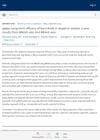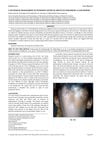 54 citations,
February 1986 in “Archives of Dermatology”
54 citations,
February 1986 in “Archives of Dermatology” Higher minoxidil concentration (5%) works better for severe hair loss, with most patients seeing regrowth in 48-60 weeks.
 40 citations,
September 2018 in “Journal of the American Academy of Dermatology”
40 citations,
September 2018 in “Journal of the American Academy of Dermatology” Tofacitinib helped some young children with severe hair loss grow their hair back without bad side effects.
14 citations,
April 2017 in “Dermatology practical & conceptual” Yellow dots are common in severe alopecia areata.
 14 citations,
January 2017 in “Skin appendage disorders”
14 citations,
January 2017 in “Skin appendage disorders” Simvastatin/ezetimibe did not effectively treat severe alopecia areata and caused side effects in some patients.
13 citations,
January 2017 in “Annals of dermatology/Annals of Dermatology” Simvastatin/ezetimibe may help some patients with severe alopecia areata regrow hair.
 9 citations,
January 2023 in “Dermatology and therapy”
9 citations,
January 2023 in “Dermatology and therapy” A 14-year-old girl with severe hair loss regrew her hair using upadacitinib.
 7 citations,
August 2023 in “Journal of the American Academy of Dermatology”
7 citations,
August 2023 in “Journal of the American Academy of Dermatology” JAK inhibitors offer new hope for treating severe alopecia areata.
 6 citations,
May 2023 in “Drugs”
6 citations,
May 2023 in “Drugs” Baricitinib helps regrow hair in adults with severe alopecia better than a placebo and is approved for treatment, but long-term effects are still unknown.
5 citations,
May 2015 in “The Journal of Dermatology” Topical corticosteroids can help treat severe alopecia areata when other treatments fail.
 4 citations,
January 2024 in “JEADV. Journal of the European Academy of Dermatology and Venereology/Journal of the European Academy of Dermatology and Venereology”
4 citations,
January 2024 in “JEADV. Journal of the European Academy of Dermatology and Venereology/Journal of the European Academy of Dermatology and Venereology” Baricitinib and ritlecitinib are recommended for severe alopecia areata, with other treatments available off-label.
 4 citations,
January 2022 in “Drug design, development and therapy”
4 citations,
January 2022 in “Drug design, development and therapy” Intramuscular corticosteroids are effective and safe for severe alopecia areata, with most patients regrowing hair, but nearly half may relapse.
 3 citations,
May 2023 in “Precision clinical medicine”
3 citations,
May 2023 in “Precision clinical medicine” Researchers found four genes that could help diagnose severe alopecia areata early.
 2 citations,
September 2022 in “Dermatologic Therapy”
2 citations,
September 2022 in “Dermatologic Therapy” Tofacitinib is a promising treatment for severe alopecia areata, with many patients experiencing complete or partial hair regrowth.
 2 citations,
September 2021 in “JAAD case reports”
2 citations,
September 2021 in “JAAD case reports” Dupilumab helped a woman with severe hair loss regrow her hair quickly and maintain it for six months after stopping treatment.
 2 citations,
December 2018 in “Journal of cosmetic dermatology”
2 citations,
December 2018 in “Journal of cosmetic dermatology” Higher CRBP1 levels are linked to more severe alopecia areata.
 2 citations,
January 2017 in “Clinical and medical investigations”
2 citations,
January 2017 in “Clinical and medical investigations” Herbal lotions are effective for severe hair loss, with a 64.8% success rate, but relapse is common and long-term management requires allergen control and possible corticosteroid use.
 1 citations,
September 2023 in “Dermatology and Therapy”
1 citations,
September 2023 in “Dermatology and Therapy” Baricitinib helps improve hair growth in severe alopecia, with better results in less severe cases and higher doses working faster.
 1 citations,
September 2023 in “Journal of the American Academy of Dermatology”
1 citations,
September 2023 in “Journal of the American Academy of Dermatology” Baricitinib significantly improves hair regrowth in severe alopecia areata.
 1 citations,
July 2023 in “Al-Azhar Medical Journal”
1 citations,
July 2023 in “Al-Azhar Medical Journal” Higher antigliadin antibodies are linked to more severe alopecia areata, suggesting screening for celiac disease in these patients.
 1 citations,
September 2022 in “Journal of The American Academy of Dermatology”
1 citations,
September 2022 in “Journal of The American Academy of Dermatology” Baricitinib helps grow eyebrows and eyelashes in severe alopecia areata patients.
 1 citations,
October 2021 in “Deleted Journal”
1 citations,
October 2021 in “Deleted Journal” Dupilumab can help regrow hair and improve skin conditions in patients with severe atopic dermatitis and alopecia areata.
 September 2024 in “Journal of the American Academy of Dermatology”
September 2024 in “Journal of the American Academy of Dermatology” Baricitinib maintains significant hair regrowth in severe alopecia areata over three years.
 December 2023 in “European journal of dermatology/EJD. European journal of dermatology”
December 2023 in “European journal of dermatology/EJD. European journal of dermatology” More effective treatments are needed for severe alopecia areata.
 November 2023 in “Dermatologica sinica/Zhōnghuá pífūkē yīxué zázhì”
November 2023 in “Dermatologica sinica/Zhōnghuá pífūkē yīxué zázhì” Upadacitinib helped regrow hair in a severe alopecia areata patient but stopping treatment caused hair loss to return.
 April 2023 in “International Journal of Research in Dermatology”
April 2023 in “International Journal of Research in Dermatology” Baricitinib is a promising treatment for severe alopecia areata with minimal side effects.
 April 2023 in “Revista colombiana de reumatología”
April 2023 in “Revista colombiana de reumatología” JAK inhibitors like tofacitinib can effectively treat severe alopecia areata.
 October 2021 in “Dermatology Reports”
October 2021 in “Dermatology Reports” Higher IL-17A levels indicate more severe alopecia areata.
 August 2021 in “Revista Colombiana de Reumatología/Revista Colombiana de Reumatologia”
August 2021 in “Revista Colombiana de Reumatología/Revista Colombiana de Reumatologia” Janus kinase inhibitors may effectively treat severe alopecia areata unresponsive to other treatments.
July 2021 in “Journal of dermatology & dermatologic surgery” IMTA can help regrow hair in severe alopecia areata when JAK inhibitors don't work well.
 March 2016 in “Journal of evolution of medical and dental sciences”
March 2016 in “Journal of evolution of medical and dental sciences” Combining OMP with cyclosporine can effectively treat severe alopecia areata in children.


























